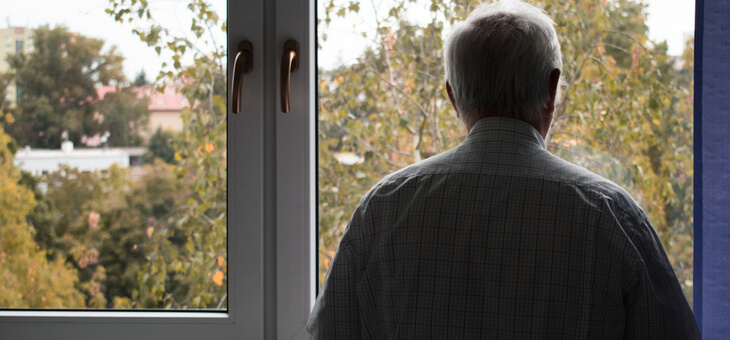More older Australians are suffering from heightened mental health issues, isolation and cognitive decline during the pandemic, with advocacy groups fearing there’s worse beneath the surface.
A direct result of COVID lockdowns and border closures is that older people are at risk of developing mental health issues and cognitive decline due to isolation.
“The sad thing is that’s the tip of the iceberg,” says the chief executive of the Australian Counselling Association, Philip Armstrong.
Physical distancing and self-isolation measures aimed at minimising the spread of COVID-19 have left many feeling socially isolated and lonely – more so for older people.
Lockdowns are causing higher levels of anxiety and depression in older Australians, and “enforced isolation” means many live in fear of going out and contracting COVID.
“And lots of them struggle with mobile phones, they struggle with computers – a lot of them are not being heard,” he says.
One elderly woman, Gold Coast resident Mo Ors, says she’s afraid to leave her home and has become a recluse since the pandemic began.
“I don’t go out … I’m frightened,” she told ABC Gold Coast.
“I get groceries delivered. I have a support worker who helps me because of my age. I have a disability and problems with my health.
“It has affected me mentally because I’ve been so frightened about what it [COVID] can do to older people.
“I couldn’t see family for a while; we’ve missed celebrations, weddings – milestones that we’ve missed and will never come back”.
People in the community who did not believe in the virus and vaccines make things worse.
“I’m very anxious because there’s a lot of people who are against the science and it’s creating friction in the community,” she says.
“I’m worried about what can happen; I feel unsafe in my own home.”
Read: Lockdowns extended, as report shows effects on cognitive ability
The pandemic has made the importance of high-quality social connections increasingly clear with social interaction essential to mental and physical health.
World Health Organization (WHO) research shows that social isolation and loneliness have a serious impact on older people’s physical and mental health, quality of life, and longevity.
It puts the effects of social isolation and loneliness on mortality up there with smoking, obesity and physical inactivity.
Some older people living alone or in aged care facilities have not seen anyone for up to 18 months, according to Older Persons Advocacy Network (OPAN) chief executive Craig Gear.
“That’s resulted in fear, anxiety, loneliness, boredom and also cognitive decline to those who have dementia or other neurological issues,” he says.
He wants to introduce a “partners in care” program, allowing an essential person or family member to have permission to regularly visit.
“We’re really worried about the physical decline and the cognitive decline of people during these extended lockdowns,” he says.
“It has an ongoing impact on people’s mental wellbeing.”
Read: What older Australians want you to know about loneliness
Understandably, he says, some may feel less confident about the world opening back up again, especially those who live in residential aged-care facilities.
Professor of psychiatry at the University of Melbourne, Steve Ellen, says this is to be expected – and is completely natural.
“Older people are more likely to suffer serious illness from COVID-19, so feeling a sense of anxiety at coming out of isolation is completely normal,” he says.
“But that doesn’t necessarily mean you should put off reconnecting with others, because the long-term risks associated with loneliness are significant.”
Reconnecting with others after each lockdown is important, especially for older people, says Prof. Ellen.
“We know that many older Australians live alone and lead quite isolated lives anyway, then they’ve been faced with taking extra precautions to stay safe due to coronavirus,” he says.
“Given that loneliness and isolation are linked to anxiety and depression, now that we’re allowed to socialise more and reconnect with others again, it’s important to do so, particularly if you’re older and live alone.”
Being able to see loved ones again will be a huge boost for many older Australians, says Mr Gear.
Read: Social isolation linked to more severe COVID-19 outbreaks
“Getting back to having visitors, in a COVID-safe way, is vital for both our mental and physical wellbeing. That goes for all of us, but particularly for older people,” he says.
“Many older people I know are really pleased that they’re able to get back to going about their daily lives.
“Something as simple as going for a walk around your local area and having a chat with your neighbours – while observing physical distancing – is a great place to start.”
Prof. Ellen agrees that it’s important for people to go at their own pace.
“There’s no one size fits all with this, so think things through and decide what you’re comfortable with, and pass this onto family and friends,” he says.
“Keep in mind that many social activities can be adapted to suit, for example, you might not feel confident heading back to a cafe to catch up with a friend just yet, but you can grab a thermos and meet them in a park where there’s plenty of space and you can remain the all-important 1.5 metres apart.
“Acknowledge that this is a time of transition and that feeling anxious is totally normal right now, and that it may take a little while to settle down.
“Be kind to yourself and anticipate some anxiety the first few times you go out, keeping in mind that it will get easier.”
What has been the biggest change to your life since the pandemic began? Will you find it difficult to return to COVID-normal? Why not share your thoughts in the comments section below?
If you enjoy our content, don’t keep it to yourself. Share our free eNews with your friends and encourage them to sign up.

